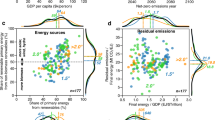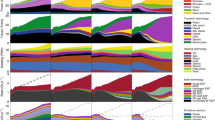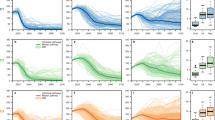Abstract
A fundamental, generally implicit, assumption of the Intergovernmental Panel on Climate Change reports and many energy analysts is that each unit of energy supplied by non-fossil-fuel sources takes the place of a unit of energy supplied by fossil-fuel sources1,2,3,4. However, owing to the complexity of economic systems and human behaviour, it is often the case that changes aimed at reducing one type of resource consumption, either through improvements in efficiency of use or by developing substitutes, do not lead to the intended outcome when net effects are considered5,6,7,8,9. Here, I show that the average pattern across most nations of the world over the past fifty years is one where each unit of total national energy use from non-fossil-fuel sources displaced less than one-quarter of a unit of fossil-fuel energy use and, focusing specifically on electricity, each unit of electricity generated by non-fossil-fuel sources displaced less than one-tenth of a unit of fossil-fuel-generated electricity. These results challenge conventional thinking in that they indicate that suppressing the use of fossil fuel will require changes other than simply technical ones such as expanding non-fossil-fuel energy production.
This is a preview of subscription content, access via your institution
Access options
Subscribe to this journal
Receive 12 print issues and online access
$209.00 per year
only $17.42 per issue
Buy this article
- Purchase on Springer Link
- Instant access to full article PDF
Prices may be subject to local taxes which are calculated during checkout
Similar content being viewed by others
References
IPCC Climate Change 2007: Mitigation of Climate Change (eds Metz, B., Davidson, O. R., Bosch, P. R., Dave, R & Meyer, L. A.) (Cambridge Univ. Press, 2007).
IPCC IPCC Special Report on Renewable Energy Sources and Climate Change Mitigation (Cambridge Univ. Press, 2011).
Hoag, H. Low-carbon electricity for 2030. Nature Clim. Change 1, 233–235 (2011).
Nuclear fallout. Nature Clim. Change 1, 69 (2011).
Sellen, A. J. & Harper, R. H. R. The Myth of the Paperless Office (MIT Press, 2002).
Polimeni, J. M., Mayumi, K., Giampietro, M. & Alcott, B. The Jevons Paradox and the Myth of Resource Efficiency Improvements (Earthscan, 2008).
Druckman, A., Chitnis, M., Sorrell, S. & Jackson, T. Missing carbon reductions? Exploring rebound and backfire effects in UK households. Energ. Policy 39, 3572–3581 (2011).
Hubacek, K. & Guan, D. The net effect of green lifestyles. Nature Clim. Change 1, 250–251 (2011).
York, R. Ecological paradoxes: William Stanley Jevons and the paperless office. Human Ecol. Rev. 13, 143–147 (2006).
York, R. Structural influences on energy production in South and East Asia, 1971–2002. Sociol. Forum 22, 532–554 (2007).
Stone, R. Mayhem on the Mekong. Science 333, 814–818 (2011).
Smil, V. Energy at the Crossroads: Global Perspectives and Uncertainties (MIT Press, 2003).
Williams, J. H. et al. The technology path to deep greenhouse gas emissions cuts by 2050: The pivotal role of electricity. Science 335, 53–59 (2012).
World Bank World Development Indicators. Available at http://data.worldbank.org/data-catalog/world-development-indicators. Accessed 20 July (2011).
Acknowledgements
I thank T. Koford for helpful comments.
Author information
Authors and Affiliations
Contributions
R.Y. designed the research, analysed the data and wrote the manuscript.
Corresponding author
Ethics declarations
Competing interests
The author declares no competing financial interests.
Supplementary information
Rights and permissions
About this article
Cite this article
York, R. Do alternative energy sources displace fossil fuels?. Nature Clim Change 2, 441–443 (2012). https://doi.org/10.1038/nclimate1451
Received:
Accepted:
Published:
Issue Date:
DOI: https://doi.org/10.1038/nclimate1451
This article is cited by
-
Decarbonizing energy: Evaluating fossil fuel displacement by renewables in OECD countries
Environmental Science and Pollution Research (2024)
-
Do renewable energy sources perfectly displace non-renewable energy sources? Evidence from Asia–Pacific economies
Environmental Science and Pollution Research (2024)
-
An assessment of different transition pathways to a green global economy
Communications Earth & Environment (2023)
-
Investigating the assumption of perfect displacement for global energy transition: panel evidence from 73 economies
Clean Technologies and Environmental Policy (2023)
-
Life cycle assessment in the context of decarbonization and carbon neutrality
The International Journal of Life Cycle Assessment (2023)



